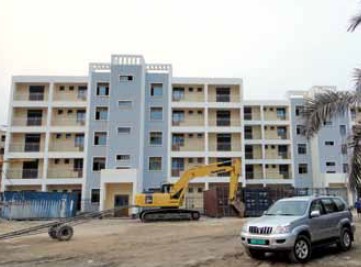|
 |
|
A highway built by BCEG in Mauritius |
Going local
Besides the high quality of its buildings, another secret behind the company's success in Africa is its constant effort to integrate with local communities. "We're increasing the number of local hires. About four years ago, there were about 10,000 Chinese employees working in our African branches. Today, that number has dropped to 2,000," Ma said, noting that local employees now account for three quarters to four fifths of the firm's total employees.
"Generally, sending one worker from China will take two jobs from locals, which is contrary to our company's commitment to doing good for locals, and also increases our human resources expenditures," Ma added.
Local workers enjoy high status in the enterprise. During the construction of the Tanzania National Stadium, many local employees only came to do odd jobs at first. "As an incentive, we awarded those who consistently came to work on time with honorary name tags. More and more Tanzanian workers came to feel a sense of belonging while working for our company," Ma said. According to him, as locals' time with the company increased, many signed labor contracts and became permanent staff. "We have local employees who have been working for our company for more than 10 years," Ma added.
The company has also faced challenges integrating into local life. For example, in some remote mountainous areas, flush toilets were dismantled and removed from new buildings before they were even opened. BCEG has developed its own way to adapt and respond to such problems. "Communication is vital to the success of a company operating in a foreign culture," Ma noted.
While building a school in Tanzania, the company donated stationery and sporting goods to the school and cleared a local road with a forklift and road roller. "Our action moved locals and won their trust, which smoothed our construction operations," Ma said. And in the spirit of keeping things local, the company also managed to purchase supplies from local agents to stimulate the local economic development.
Other efforts to become involved in local communities have included sponsoring ping-pong games at the company's branch in Mauritius, opening a free clinic for local workers in Angola, and organizing volunteers to assist with local environmental protection in Rwanda.
 |
|
Residential buildings built by BCEG in the capital of the Republic of the Congo stand firm after explosions in March 2012 |
Social responsibility
All employees of BCEG have promising career prospects. Some local employees have been promoted to work as management staff.
In 2013, the company will organize a training course at Beijing University of Civil Engineering and Architecture and invite its African senior technicians and engineers to attend and learn more sophisticated skills.
"In the future, we will recruit more local employees to work in overseas branches," said Ma, citing plans to have more locals to work as senior finance directors, engineers, technicians and project managers. In his eyes, the company should be more open, absorb more local elites and be more transparent with its finances. "We are trying to be more open to the public and show them how the company is running," Ma added. "In our overseas operations, our mission is to foster the well-being of local communities." |